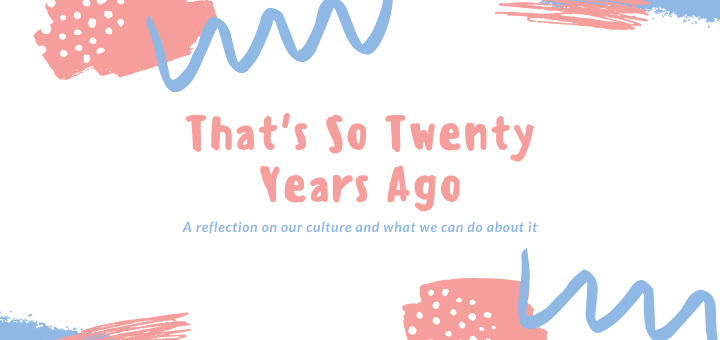
 Image created byLindsay Schlegel in Canva.com using free elements.[/caption]
Last month, my 21-month-old son dropped (slash kind of threw) a glass jar of sprinkles in the local Home Goods store. The jar shattered, but thankfully, no one was hurt. I had thought I was coming close to pushing him too far in my search for the perfect dessert decoration, and I instantly regretted staying in the store as long as I did.
I found an employee and told her about the jar. I offered to pay for it, but she waved me off. She told me my not to worry about it, and went as far as to say my offer was something from twenty years ago.
O ... kay.
I found another jar of sprinkles, refused to hand it to my squirmy child, and quickly made my way to the checkout. At the register, I again mentioned the jar and that the other woman had told me not to worry about paying for it. The cashier made no further comment. I paid my $2.99 plus tax and left the store.
As I drove off (and my kiddo settled into a much-needed nap) I couldn’t stop thinking about this idea that making amends for a mistake or an error in judgment was a thing of the past. Our culture, this comment suggests, is beyond taking responsibility for our actions and has thoroughly embraced the philosophy of “you do you.”
Another moment, a month or so before came to mind: I was talking about a young adult novel with a fellow writer, someone very talented and someone who holds different beliefs than I. I said that I was disappointed to see Jesus’s name used in vain so many times throughout this particular book, and suggested that this element of the storytelling may mean that some parents aren’t going to want their kids to read said book.
Her reply was understanding to a degree, but she also made clear that parents who thought their teens hadn’t heard vulgar language before were deluding themselves.
It wasn’t the time or place to rebut, but this exchange stuck with me in a similar way to the sprinkles incident. To my mind, a parent can (and should) be cognizant of what her child is taking in, so that she can counsel that child as to how best to handle that input. Just because a child hears people speaking poorly doesn’t mean it ought to be condoned. It seems to me there’s a lot of space between these two things. Why have we lost that distinction?
What has our culture become if we think that breaking something that doesn’t belong to us doesn’t require an act of repentance? And are we making a strong enough attempt to form our children if “they’ve probably already heard that” minimizes the need to teach them right from wrong?
I realize I am preaching to the choir by posting these reflections at CatholicMom.com, but my hope is that these moments will be as much of a wake-up call for you as they were for me. The truth of the matter is this: The hard work we are doing in our homes matters. The ways we are forming our children matter. The ways we are forming ourselves matter. Values out of step with contemporary ideals are not necessarily wrong; on the other hand, at times it can seem the more contrary, the better.
[tweet "If common courtesy and discernment of the media are relics of the past, then we have work to do. -@lindsayschlegel"}
If common courtesy and discernment of the media are relics of the past, then we have work to do. These values are as important now as they’ve ever been before. Our brothers and sisters have always had dignity as children of God, and no technological advance or social shift can change that.
So here’s a question for you: what disheartening revelation have you made about our culture, and more importantly, what are you doing in your domestic church to right it?
Image created byLindsay Schlegel in Canva.com using free elements.[/caption]
Last month, my 21-month-old son dropped (slash kind of threw) a glass jar of sprinkles in the local Home Goods store. The jar shattered, but thankfully, no one was hurt. I had thought I was coming close to pushing him too far in my search for the perfect dessert decoration, and I instantly regretted staying in the store as long as I did.
I found an employee and told her about the jar. I offered to pay for it, but she waved me off. She told me my not to worry about it, and went as far as to say my offer was something from twenty years ago.
O ... kay.
I found another jar of sprinkles, refused to hand it to my squirmy child, and quickly made my way to the checkout. At the register, I again mentioned the jar and that the other woman had told me not to worry about paying for it. The cashier made no further comment. I paid my $2.99 plus tax and left the store.
As I drove off (and my kiddo settled into a much-needed nap) I couldn’t stop thinking about this idea that making amends for a mistake or an error in judgment was a thing of the past. Our culture, this comment suggests, is beyond taking responsibility for our actions and has thoroughly embraced the philosophy of “you do you.”
Another moment, a month or so before came to mind: I was talking about a young adult novel with a fellow writer, someone very talented and someone who holds different beliefs than I. I said that I was disappointed to see Jesus’s name used in vain so many times throughout this particular book, and suggested that this element of the storytelling may mean that some parents aren’t going to want their kids to read said book.
Her reply was understanding to a degree, but she also made clear that parents who thought their teens hadn’t heard vulgar language before were deluding themselves.
It wasn’t the time or place to rebut, but this exchange stuck with me in a similar way to the sprinkles incident. To my mind, a parent can (and should) be cognizant of what her child is taking in, so that she can counsel that child as to how best to handle that input. Just because a child hears people speaking poorly doesn’t mean it ought to be condoned. It seems to me there’s a lot of space between these two things. Why have we lost that distinction?
What has our culture become if we think that breaking something that doesn’t belong to us doesn’t require an act of repentance? And are we making a strong enough attempt to form our children if “they’ve probably already heard that” minimizes the need to teach them right from wrong?
I realize I am preaching to the choir by posting these reflections at CatholicMom.com, but my hope is that these moments will be as much of a wake-up call for you as they were for me. The truth of the matter is this: The hard work we are doing in our homes matters. The ways we are forming our children matter. The ways we are forming ourselves matter. Values out of step with contemporary ideals are not necessarily wrong; on the other hand, at times it can seem the more contrary, the better.
[tweet "If common courtesy and discernment of the media are relics of the past, then we have work to do. -@lindsayschlegel"}
If common courtesy and discernment of the media are relics of the past, then we have work to do. These values are as important now as they’ve ever been before. Our brothers and sisters have always had dignity as children of God, and no technological advance or social shift can change that.
So here’s a question for you: what disheartening revelation have you made about our culture, and more importantly, what are you doing in your domestic church to right it?
Copyright 2019 Lindsay Schlegel
About the Author

Lindsay Schlegel
Lindsay Schlegel is a daughter of God, wife, mom, editor, and speaker. She’s the author of Don’t Forget to Say Thank You: And Other Parenting Lessons That Brought Me Closer to God and host of the podcast Quote Me with Lindsay Schlegel. Lindsay seeks to encourage, inspire, and lift others up to be all they were created to be. Connect with Lindsay at her website, LindsaySchlegel.com.


.png?width=1806&height=731&name=CatholicMom_hcfm_logo1_pos_871c_2728c%20(002).png)
Comments